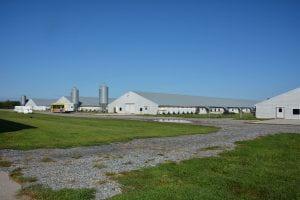 Georgie Cartanza welcomed the class to her Organic Poultry Farm in Little Creek, Delaware; ran under Perdue’s organic branch Coleman Natural Foods. She has been raising broilers for almost 15 years now and has seen how the organic sector has changed throughout the years. What does organic chicken mean? The United States Department of Agriculture declares poultry organic if it is GMO and hormone-free, has access to the outdoors with enrichment toys and shade, plus has significant space in the chicken house with access to natural sunlight. These environmental requirements were all set and pushed for by the consumer in order to provide chickens with a “happy” lifespan since the number one questions consumers ask about their food is if it is humanly produced. However, many of these requirements may or may not be the best option for the health and safety of the chickens. Biosecurity is a top priority for any food system. Chickens having open access to the outside affect the biosecurity of the chickens. Pests, predators, and diseases have a higher chance of affecting the flock. In a few years, Georgie will have to plant tall grasses, trees, and other natural plants to provide shade for the outside pasture to meet updated organic standards. While the tall grasses can be planted in front of the house fans to help control air quality, the trees could attract predators and welcome other vectors of disease. As Georgie best puts it: raising chickens is a balancing act between consumer wants and what is best for the chicken. It is very clear how much she cares and loves for the chickens and wants the best all-around.
Georgie Cartanza welcomed the class to her Organic Poultry Farm in Little Creek, Delaware; ran under Perdue’s organic branch Coleman Natural Foods. She has been raising broilers for almost 15 years now and has seen how the organic sector has changed throughout the years. What does organic chicken mean? The United States Department of Agriculture declares poultry organic if it is GMO and hormone-free, has access to the outdoors with enrichment toys and shade, plus has significant space in the chicken house with access to natural sunlight. These environmental requirements were all set and pushed for by the consumer in order to provide chickens with a “happy” lifespan since the number one questions consumers ask about their food is if it is humanly produced. However, many of these requirements may or may not be the best option for the health and safety of the chickens. Biosecurity is a top priority for any food system. Chickens having open access to the outside affect the biosecurity of the chickens. Pests, predators, and diseases have a higher chance of affecting the flock. In a few years, Georgie will have to plant tall grasses, trees, and other natural plants to provide shade for the outside pasture to meet updated organic standards. While the tall grasses can be planted in front of the house fans to help control air quality, the trees could attract predators and welcome other vectors of disease. As Georgie best puts it: raising chickens is a balancing act between consumer wants and what is best for the chicken. It is very clear how much she cares and loves for the chickens and wants the best all-around.
